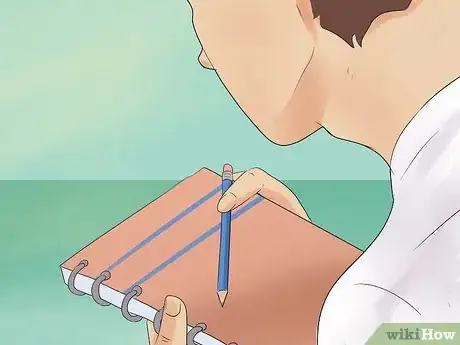This article was co-authored by Ronitte Libedinsky, MS. Ronitte Libedinsky is an Academic Tutor and the Founder of Brighter Minds SF, a San Francisco, California based company that provides one-on-one and small group tutoring. Specializing in tutoring mathematics (pre-algebra, algebra I/II, geometry, pre-calculus, calculus) and science (chemistry, biology), Ronitte has over 10 years of experience tutoring to middle school, high school, and college students. She also tutors in SSAT, Terra Nova, HSPT, SAT, and ACT test prep. Ronitte holds a BS in Chemistry from the University of California, Berkeley, and an MS in Chemistry from Tel Aviv University.
There are 16 references cited in this article, which can be found at the bottom of the page.
This article has been viewed 144,082 times.
Going to school is a necessary part of growing up. To keep school and stress-free as possible, you can learn to prepare for any level of school, get through your day with as little hassle as possible, and try to have some fun along the way.
Steps
Getting Prepared
-
1Get the necessary school supplies. One of your big responsibilities is to make sure that you have everything you'll need to be successful at school. Many times, teachers will make supply lists available a few weeks before school starts, to make sure you have enough time to get everything you'll need.[1] Whether you're starting a new school or just returning after a summer break, some common supplies include:[2]
- Pencils
- Pens
- Notebook paper
- Crayons
- Binders or folders
- Glue
- An eraser
- A ruler
- Highlighters
- Exercise books
-
2Learn your class schedule. Before you go to school, you need to make sure you know where you're going when you get there. Depending on what level of school you're in, you might just have one classroom, or you may have to go between classrooms.
- If you're in middle school or junior high school, it's common to go and walk your class schedule once you find out where your classrooms will be. Find out how long the passing period is and make sure you'll have enough time to get to each class. A little practice helps.
Advertisement -
3Figure out the bus route. Many students take the bus to school, which is usually the easiest way of getting there, but there are all kinds of different ways to get to school. If you live close enough, you can walk, ride a bike, or get a ride from someone. Usually, the school makes bus routes available before the year starts, so you can find out where and when you need to catch the bus to get to school.[3]
-
4Decide what you'll wear. To make the morning before school as easy and stress free as possible, decide what you're going to wear the night before you have to go to school. Lay out your clothes, take a bath or shower, and get as much sleep as possible so you'll be ready for the first day.[4]
- It's always a good idea to eat breakfast in the morning before school to keep your energy levels high until lunch time.[5] You don't want to be sluggish on your first day.
- If you're bringing a lunch, pack it the night before and keep it in the fridge so all you've got to do is grab it and go.
-
5Get to school on time. However you're getting to school, it's important to show up on time, especially on the first day. Once you get to school, try not to waste too much time talking to your friends and messing around at your locker, and just head to class as quickly as possible.
Doing Well in School
-
1Listen to the teacher and follow instructions. When you get to class, try to stay focused on doing what your teacher says. In the first few days of each semester, you'll probably have a lot of introduction activities to do, mostly getting to know the other students and the teacher. It shouldn't be too difficult, but it's still important to listen closely, do what you're told, and pay attention to any homework tasks you're supposed to accomplish.[6]
- Be quiet in class and avoid talking to your friends. It's important to establish early in the semester that you're a good student and not get started off on the wrong foot.
-
2Take notes. You'll probably have a lot of new stuff to keep track of in the early days of your new school, and it's important to keep them written down in your notebook. try to keep track of each homework assignment, as well as what you're learning about your various subjects. It can be hard to remember everything, so you definitely need to write it down.[7]
- Keep organized by having a different notebook for each subject, or having a few sheets of paper in each folder you have for different classes to keep your notes separated.
-
3Participate in class. Answer questions occasionally when the teacher opens up, and contribute to class discussions. Do the assignments that your teacher provides in a timely manner. When you're in class, try to participate as much as possible and stay on task to establish that you're a good student and a contribution to the class.
-
4Ask questions when you don't understand something. If you don't understand something, don't wait for someone else to ask to clarify. If you're confused, it's likely that someone else is confused too, and that you're doing them a favor. Teachers usually appreciate when students are brave enough to ask questions and make sure that everyone is getting the concept or the idea that's being taught.[8]
-
5Stay organized. Keep your binders, folders, and backpack well organized and as clean as possible. Make sure you can find everything you need for class quickly and effectively, and keep your homework assignments tidy and in the front of your folders.[9]
- If you're a messy student, try to get in the habit of going through your backpack and binder every couple of weeks to get things cleaned out. If you've got old papers that aren't important any more, it can be a big stress reducer to throw stuff out and get rid of it.
- Keep a paper or digital calendar to write all of your homework, upcoming tests, and assignments in so you don't forget.[10]
Having Fun in School
-
1Find your group. Try to find other students who you have something in common with. If you're a sports find, find your friends on the basketball court at recess. If you're a sci-fi obsessive, chat up the kid you see reading a Star Wars novel at lunch. If you can't get music out of your head, keep a look out for other people sneaking iPods onto the bus.
- Alternatively, try to be friendly with everyone.[11] If you don't know someone well, look for a reason to get to know them a little better. Befriend people in your neighborhood that you go to school with, so you'll have nearby buddies. Befriend smart students in your class so you'll have homework helpers.
-
2Participate in extracurricular activities. A great way to make friends is to join up with clubs, sports teams, the school band, or other after-school opportunities that your school offers. Each school will have different opportunities available, from chess clubs to Japanese Societies, so you'll have to find out what's available at yours.[12]
- Alternatively, if you want to start a club that doesn't exist, find a faculty sponsor and try to organize one. Want to get a Super Smash Bros. after school club started? Talk to a teacher and see what it takes to get one started.
-
3Balance your time. School can get stressful, with all the social responsibilities and the homework responsibilities. To make sure that school stays fun, try to stay as organized and as balanced as possible, keeping enough time for your homework.[13]
- If you're a procrastinator, try to schedule enough time to get everything done. If you schedule a particular block of homework time, you can avoid your procrastination tendencies and free up your extra time to have fun.[14]
-
4Stay focused on the future. School isn't easy for everyone. If you're not having much fun at school, try to remember that you're not alone, and that eventually things will get better. Lots of kids who hate middle school have a great time in high school, while students who have miserable high school experiences grow up to be successful and fascinating adults. The small world of your school will soon get a lot bigger when you're done. Work hard now, try to have as much fun as you can, stay out of trouble, and get it over with it. It gets better.[15]
- Try to keep a good attitude about school, if at all possible. If you're really struggling, talk to your parents about your experience, or talk to a guidance counselor at school if your parents are unwilling to listen. They can help. Don't keep it to yourself.[16]
Things You'll Need
- Pencils
- Pens
- Notebook paper
- Highlighters
- An Organizer
- Erasers
- Sharpener
- Ruler
- Tab Dividers
- Binders
- Notebooks
- Headphones (for computer class in middle and high school)
References
- ↑ https://www.realsimple.com/work-life/family/kids-parenting/back-school-essentials-checklist
- ↑ https://www.cozi.com/blog/high-school-supplies-list/
- ↑ http://guide.saferoutesinfo.org/school_bus_locations/determining_school_bus_stop_locations.cfm
- ↑ https://www.care.com/c/stories/3198/15-tips-on-how-to-get-ready-for-school-quickl/
- ↑ https://www.treehugger.com/green-food/8-quick-and-healthy-breakfasts-easy-school-mornings.html
- ↑ https://www.edutopia.org/blog/training-the-brain-to-listen-donna-wilson
- ↑ https://learningcenter.unc.edu/tips-and-tools/effective-note-taking-in-class/
- ↑ https://counseling.uiowa.edu/self-help/tips-for-participating-in-class-discussions/
- ↑ https://www.daniel-wong.com/2017/04/10/students-get-organised-for-school/
- ↑ Ronitte Libedinsky, MS. Academic Tutor. Expert Interview. 26 May 2020.
- ↑ https://conversation-skills-core.com/how-to-be-friendly/
- ↑ https://www.crimsoneducation.org/us/blog/benefits-of-extracurricular-activities
- ↑ http://jhsap.org/self_help_resources/school-life_balance/index.html
- ↑ https://www.daniel-wong.com/2016/01/18/stop-procrastinating-on-homework/
- ↑ https://www.wgu.edu/heyteach/article/advice-for-high-school-freshmen-from-departing-seniors1808.html
- ↑ http://kidshealth.org/kid/feeling/school/hate_school.html#
- ↑ Ronitte Libedinsky, MS. Academic Tutor. Expert Interview. 26 May 2020.
- ↑ Ronitte Libedinsky, MS. Academic Tutor. Expert Interview. 26 May 2020.
About This Article
Before you go to school, make sure to get all of the school supplies you will need, like notebooks, pencils, and binders. If your school sent out a supply list, purchase those items if you can. Once you have your supplies, learn your class schedule so you will know where you are supposed to go. Then, decide how you will get to school and look up bus routes, if you need to. On the first day of school, pay attention to your teacher and take notes so you will remember what was covered. To learn how to have fun in school, scroll down!











































































